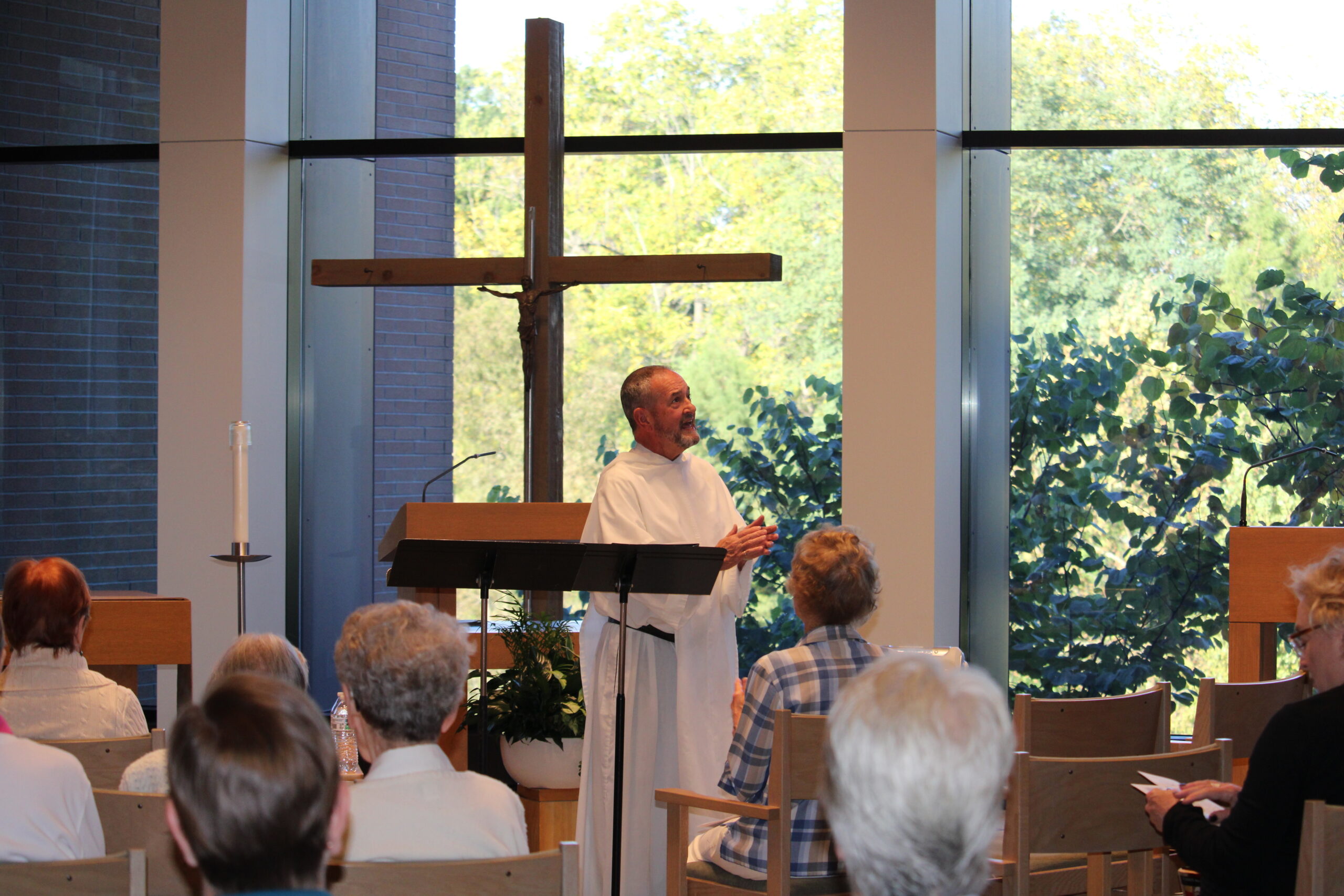
by: Mindy Hills, Director, Dominican Center Marywood at Aquinas College
Father Jim Marchionda, OP, used history, story, music, and prayer to deepen our understanding of lamentation and a love that knows no boundaries.
On a crisp and sunny Saturday morning in October in Chapel of the Word at Marywood, he invited us to devote time together celebrating the One who loves us more than we can dare imagine through lamentation, a spiritual practice that is somewhat of a lost form. During lamentation, either communal or individual, we are encouraged to name what breaks our hearts.
“Sometimes, child, suffering is suffering. It just is. Even when you run from the pain. God sees you,” preached Father Jimmy.
“Lamentation is what faithfulness looks and sounds like when we mourn.”
“Engaged contemplative prayer does what nothing else can do. It sustains us in God’s presence with our agony and our rage.”
Somehow, we have been taught even in our prayers to avoid feelings. Lament is a spiritual practice of expressing grief, sorrow, pain, and confusion. There can be no healing, no praise, not true rejoicing until we have stopped running away from mourning. We must feel to heal.
Citing Adam Bucko, author of Radical Resilience, we were reminded: “Let your heartbreak be your guide.” Think of lamentation as a stage in the journey. “Resilience is about the life of God flowing through us, remaking us into something that is whole and reflects God.”
Referencing Richard Rohr, OFM, Father Jimmy said: “Lament is truth-telling that engages the heart and mind… it has a dangerous edge… it’s not just a complaint to God, but about God.“ Could it be that lamenting well can lead us back to praise… a praise even more profound than our sorrow?” asked Father Jimmy.
Psalms and scriptures invite us into the prayer of lament. A psalm of lament is an address to God: a complaint, a request and usually an expression of trust. This appeal might indicate concerns with God’s action or inaction based on our trust of God’s character.
Jesus gave us an example of lamentation as he hung on the cross: `My God, my God, why have you forsaken me?’ Psalm 22:1-2
Do we give ourselves permission to lament when we come together in prayer? Father Jimmy suggested there is power in community lamentation when one is not necessarily experiencing lament in his or her own life. “Coming together can foster strength, unity, and even a hopeful joy as we remember together God’s faithfulness.”
Contemplative prayer, a very Dominican value, does what nothing else can do for us. It sustains us in God’s presence. It leads us to the place where we are held by God. This prayer form is described as a dance between the Word and silence, where openness to God is encouraged
This is why contemplative prayer is integral in the formative experiences that our spiritual directors are encouraged to practice as they journey through Foundations in Spirituality and the first and second years of the Practicum intensives.
“Lament can give us a language of worship… allowing emotions to rush forward,” said Father Jimmy, as he invited us to sing the familiar hymn, How Can I Keep from Singing. “This song summarizes how, when we remain faithful, we are sustained in God’s holy embrace.
“Throughout history and especially relevant in today’s world of chaotic destruction, loss and despair, God is there among the weeds and wounds of the world, whispering to us.”
Using his giftedness as a composer and musician during this retreat, Father Jimmy led participants through an experience of prayer, praise, lament, and then back to praise.
Take some time, today, to sample moments from our retreat. Sing, hum, or read along to the hymn below.
“My life flows on in endless song. Above earth’s lamentation. I hear the real though far-off hymn. That hails a new creation.
No storm can shake my inmost calm,
While to that rock I’m clinging.
Since Christ is Lord of heaven and earth,
How can I keep from singing?”

